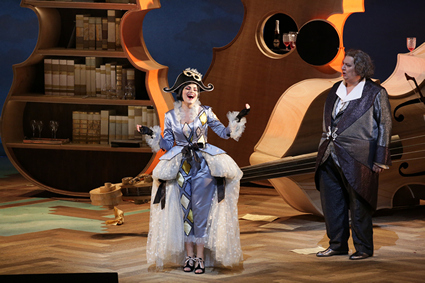| Opera Reviews | 25 April 2024 |
An engaging Salieri/Puccini double bill at La Scalaby Silvia Luraghi |
|
| Salieri: Prima la musica, poi le parole Puccini: Gianni Schicchi Teatro alla Scala, Milan 19 July 2019 |
|

Prima la musica, poi le parole: Francesca Pia Vitale (Tonina), Ambrogio Maestri (The Composer)
|
|
|
As last offering before the summer break, La Scala brought to Milan Woody Allen’s Los Angeles production of Giacomo Puccini’s Gianni Schicchi in a double bill with the company premiere of Antonio Salieri’s Prima la musica, poi le parole directed by Grischa Asagaroff. For the two one-act pieces the company cast a group of young singers from La Scala’s Academy led by bass baritone Ambrogio Maestri. In spite of being a seldom performed work, Prima la musica, poi le parole has reached celebrity status for having been the vehicle for the competition between Mozart and Salieri, a competition set up by Emperor Joseph 2nd to decide between Italian opera or German Singspiel, as well as for having inspired Richard Strauss’ opera Capriccio one and half century later. In Salieri’s opera (more precisely ‘divertimento teatrale’) the main character is a Kappelmeister or Maestro di cappella auditioning two prima donnas with the assistance of the poet. Donna Eleonora, hired by the Count that commissioned the opera, is an opera seria singer, while Tonina is a buffa. The two women argue until they end up singing the same aria at the same time until the composer finally agrees to find a solution that fits both. Salieri’s music offers a parody of the most typical features both of the serio and of the buffo styles, especially prominent in the singing of the two prima donnas. Ambrogio Maestri appeared perfectly at ease in the role of the Kappelmeister, with sopranos Anna Doris Capitelli (Donna Eleonora) and Francesca Pia Vitale (Tonina) convincingly pushy in the roles of the two quarreling prima donnas and bass baritone Maharram Huseynov depicting a bewildered and overwhelmed poet. Set designer Luigi Perego highlighted the musical side of the plot by placing some giant musical instruments on stage as setting for the composer’s studio. Woody Allen’s production of Gianni Schicchi remains the director’s only contribution to the field of opera. With respect to its 2008 Los Angeles premiere, the staging was somewhat adapted for the Italian audience by removing a few of the numerous stereotype representations of Italy according to American views. Still, the sets designed by Santo Loquasto featured a mixture of various famous Italian locations, with the Florentine churches recognizable in the background, some Roman columns, laundry hanging on lines outside the windows as in typical Neapolitan alleys. The setting placed the action at the time of Italian Neorealismo, with Zita looking like a mock Anna Magnani in her cooking apron. Ambrogio Maestri was an authoritative Schicchi. At his side, soprano Francesca Manzo was especially compelling as Lauretta, and earned a well-deserved tribute of applause at the end of her aria “O mio babbino caro”. Tenor Chuan Wang as Rinuccio displayed a handsomely colored, ringing voice with however poor diction and a somewhat generic interpretation. In the pit, Ádám Fischer offered a reliable lead to La Scala’s orchestra.
|
|
| Text ©
Silvia Luraghi Photo © Teatro alla Scala |
|







